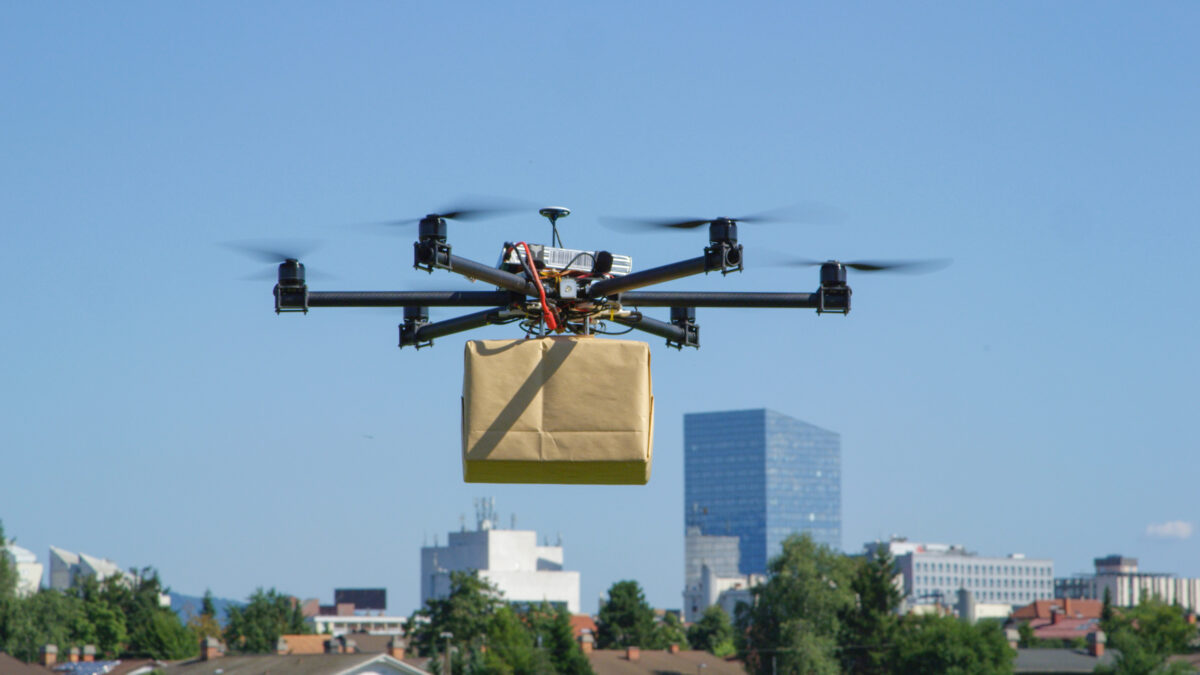The NHS in Scotland will be able to use drones as part of a new distribution network for essential medicines, bloods and other medical supplies after securing £10.1m in funding.
Clinicians will be able to transport vital medical aid as part of a ground-breaking ‘future flight’ programme supported by UK Research and Innovation (UKRI).
The project is led by AGS Airports – the owner of Aberdeen, Glasgow and Southampton Airports – and involves 16 partners including NHS Scotland, University of Strathclyde and NATS, the main air navigation service provider in the United Kingdom. It is the second successful round of funding for the CAELUS (Care & Equity – Healthcare Logistics UAS Scotland) consortium.
Fiona Smith, AGS Airports group head of aerodrome strategy and CAELUS Project Director, said: “The CAELUS project is set to revolutionise the way in which healthcare services are delivered in Scotland. A drones network can ensure critical medical supplies can be delivered more efficiently, it can reduce waiting times for test results and, more importantly, it can provide equity of care between urban and remote rural communities.
“The second round of funding from UKRI will allow our consortium to undertake live flights and begin to deploy the physical infrastructure needed to support the drones across Scotland. This will involve building prototype landing bases as well as digital and communication infrastructure. We will also work with local communities to ensure they understand why and how the drones will be used.”
Since securing £1.5m in January 2020, the CAELUS consortium has designed drone landing stations for NHS sites across Scotland and developed a virtual model (digital twin) of the proposed delivery network which connects hospitals, pathology laboratories, distribution centres and GP surgeries across Scotland.
NHS Scotland has said it will bring its “Once for Scotland” approach to the project, the second phase of which will involve live flight trials and removing remaining barriers to safely using drones at scale within Scotland’s airspace.
Public Health Minister Maree Todd said: “This innovative project will help position Scotland at the forefront of drone technologies to deliver essential healthcare supplies to people more quickly and provide equity of care between urban and remote rural communities.
“It also demonstrates an effective industry partnership showing that when businesses, universities and public sector work together they can deliver for Scotland and outperform the competition, attracting welcome funding at this challenging time.”
Professor David Lowe, national clinical director, Scottish Health and Industry Partnership (SHIP), Scottish Government, said: “The CALEUS project is an exemplar of the large-scale innovation projects Scotland is capable of delivering. Through the NHS innovation test bed infrastructure and by taking a ‘Once for Scotland’ approach, we can determine the viability, scalability and efficiency of the technology, and its potential impact across the NHS.
“This fusion of skills and knowledge is vital to accelerate the pace of adaption of innovative technologies and support our work to strengthen health and social care innovation in Scotland.”
Lynne McNiven, director of public health in NHS Ayrshire & Arran, said: “We are excited to be part of the innovative CAELUS project looking at what drone technology could offer patients and services across Scotland.
“We have been looking at how drone technology in Ayrshire and Arran has the ability to enhance the delivery of medical care locally, with the potential of improving patient care and the equity of care between urban and remote rural communities.”
Dr Andy Keen, clinical lead for innovation, NHS Grampian, said: “NHS Grampian is proud to be the lead board for NHS Scotland on CAELUS and we very much look forward to working with our sister health boards across Scotland, and our industry partners over the next couple of years.”
“All the participating boards will make a significant contribution to this important evaluation about care delivery in Scotland. Our local Innovation HUB will be exploring how drone technology could be usefully used as a way of delivering care to people who live in urban, remote, rural and island locations.
“Our region is possibly uniquely positioned to test this because it covers such a vast geographical area with an approximately 50/50 spilt of urban and rural populations.
Live flight trials will be operated by CAELUS consortium member Skyports. The UK-based drone services provider is an experienced operator of medical and dangerous goods cargo flights. The company was instrumental to early trial flights with NHS Scotland in 2020 and 2021, completing over 12,000 of flight hours in the region to date.
Alex Brown, director of Skyports Drone Services, said: “The benefits case for drone operations in Scotland is clear, particularly across the public health sector. We’ve already demonstrated the positive impact drone interventions can have on individuals and communities, and we’re eager to kick-off the next round of flight trials with the view to soon be facilitating permanent drone deliveries to connect people to these essential supplies – wherever they are.”
“The CAELUS project is evidence of building momentum in this space. We’re excited to work with partners to deliver impactful innovation.”
Dr Marco Fossati, of the Aerospace Centre of Excellence at the University of Strathclyde, said:“This second tranche of funding will allow the CAELUS project to move to the next exciting stage with flight trials of the drones and testing of the critical systems we have designed that will ensure the safe operation of what will be a revolutionary development for aviation in the UK and for NHS Scotland.”
Gary Cutts, Future Flight Challenge director at UK Research and Innovation, said “With the potential to quickly deliver medicines, bloods and other medical supplies on demand, the CAELUS project laid the groundwork for revolutionising health care access across Scotland. We know these technologies can change people’s lives, but it’s important we work with communities to understand how they will best benefit from them. By working with local communities and taking a national approach CAELUS 2 will strengthen heath care provision in Scotland.”




